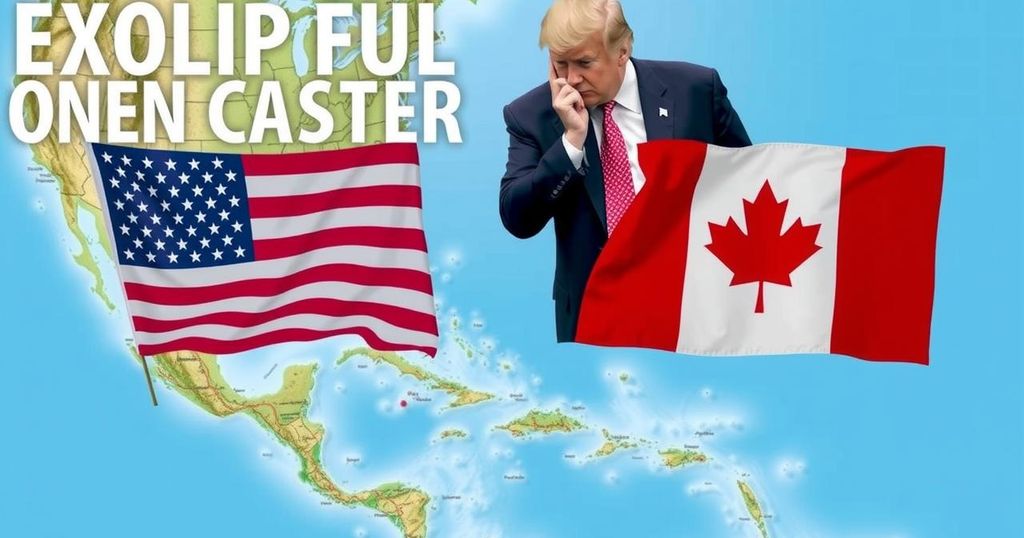World news
ALASKA, AMERICA, ARIZONA, ASIA, ATLANTIC, BIDEN ADMINISTRATION, CANADA, CNN, CNN POLITICS, DONALD TRUMP, EUROPE, EUROPE/ASIA, FENTANYL LABS, GREENLAND, LOUISIANA, LOUISIANA PURCHASE, MEXICO, NATIONAL SECURITY, NORTH AMERICA, PACIFIC, PANAMA, PANAMA CANAL, PHILIPPINES, POLITICS, RUSSIA, TRUMP, TRUMP ADMINISTRATION, U.S. ELECTIONS, UNITED STATES, US
Fatima Alavi
0 Comments
Trump Teases U.S. Expansion into Canada, Panama, and Greenland
President-elect Donald Trump has suggested potential American territorial expansion by targeting Canada, reviving interest in the Panama Canal, and Greenland. His remarks may mix serious ambitions with political theatrics reminiscent of historical expansionist sentiments. While receiving swift pushback from foreign officials, these comments underline his strategy to influence negotiations with Canada and Mexico regarding trade and border security ahead of taking office.
President-elect Donald Trump has been contemplating an expansion of U.S. territory, hinting at the annexation of Canada, taking control of the Panama Canal, and reviving interest in acquiring Greenland. His provocations, characterized by a mix of jest and potential serious policy aspirations, suggest a focus reminiscent of the 19th-century Manifest Destiny—a belief in the country’s divine right to expand. During a recent speech in Arizona, Trump articulated his intentions regarding the Panama Canal, warning officials that lower fees for American vessels are expected, alluding to a nationalistic agenda under the banner of “America First.”
In addition to the Panama Canal, Trump mentioned that obtaining Greenland is a necessity for national security, even as he faces rejection from Danish officials regarding this notion. The Prime Minister of Greenland firmly stated, “Greenland is ours and we are not for sale and will never be for sale,” seeing the issue as settled for the time being. Though these topics have raised substantial discussion, the motives behind Trump’s territorial interests remain somewhat unclear, as advisors close to him suggest they may simply be influences from social interactions rather than serious policy proposals.
Trump’s relationship with Canada also has been propagated through recent taunts about annexation, likely intended to provoke Canadian Prime Minister Justin Trudeau. By suggesting a territorial union, he further played into negotiations that could benefit U.S. interests amid ongoing tariff discussions with Canada and Mexico.
While Trump’s administration takes shape, leaders from both Canada and Mexico have shown an immediate interest in addressing U.S. border control needs in light of his proposed tariffs on goods. The implications of such negotiations suggest a strategic approach aimed at ensuring foreign leaders reaffirm their commitments to U.S. border security even before Trump assumes office.
The article discusses President-elect Donald Trump’s provocative statements concerning potential U.S. territorial expansion, drawing parallels to historical acquisitions like the Louisiana Purchase and the acquisition of Alaska. Trump has recently suggested that Canada could become the 51st state, threatened to take control of the Panama Canal, and revived his earlier interest in purchasing Greenland. These comments reflect a mixture of serious policy considerations and media stunts, all while echoing the 19th-century notion of Manifest Destiny that underscored American expansionism. Trump’s nationalistic rhetoric raises questions about the underlying motivations for these statements and their potential implications for U.S. foreign relations, particularly with Canada and Denmark.
In summary, President-elect Donald Trump’s musings about territorial expansion into Canada, Greenland, and control over the Panama Canal reveal a blend of political provocation and possible policy intentions that echo historical sentiments of territorial entitlement. While these statements have sparked backlash and rejection from international leaders, they also reflect Trump’s broader strategy to engage foreign nations concerning trade and national security. The ongoing interaction between the U.S. and its neighboring countries will undoubtedly shape the political landscape as Trump prepares to assume the presidency.
Original Source: www.cnn.com




Post Comment